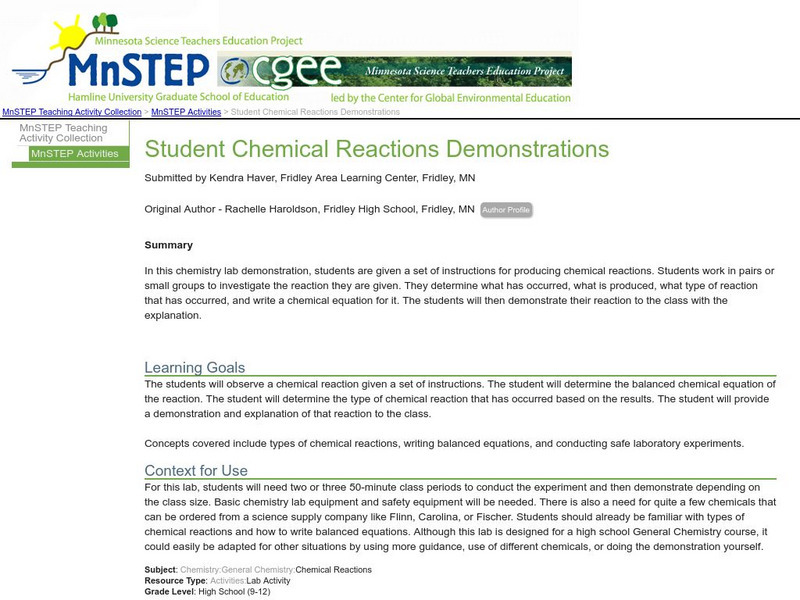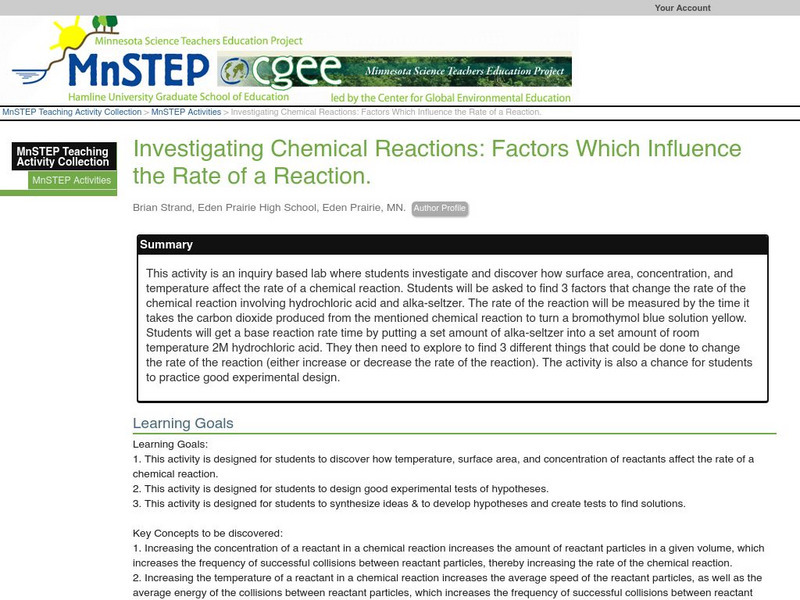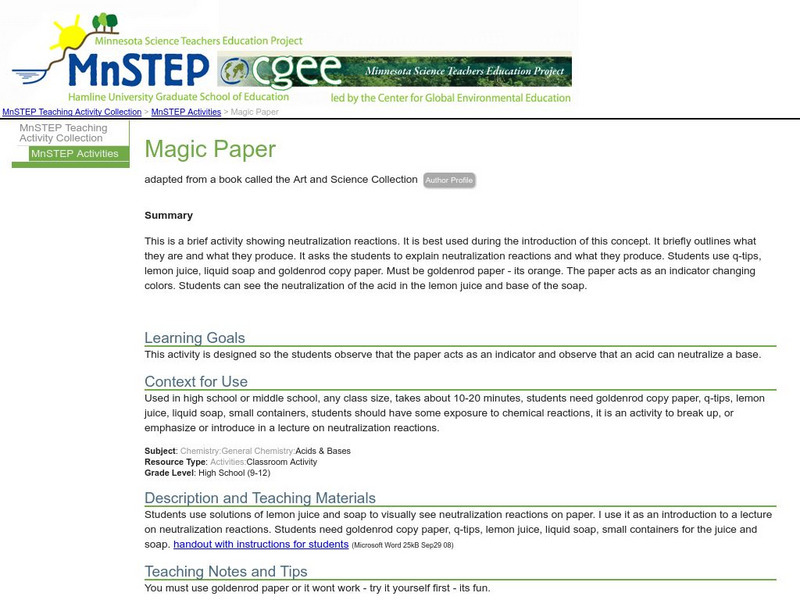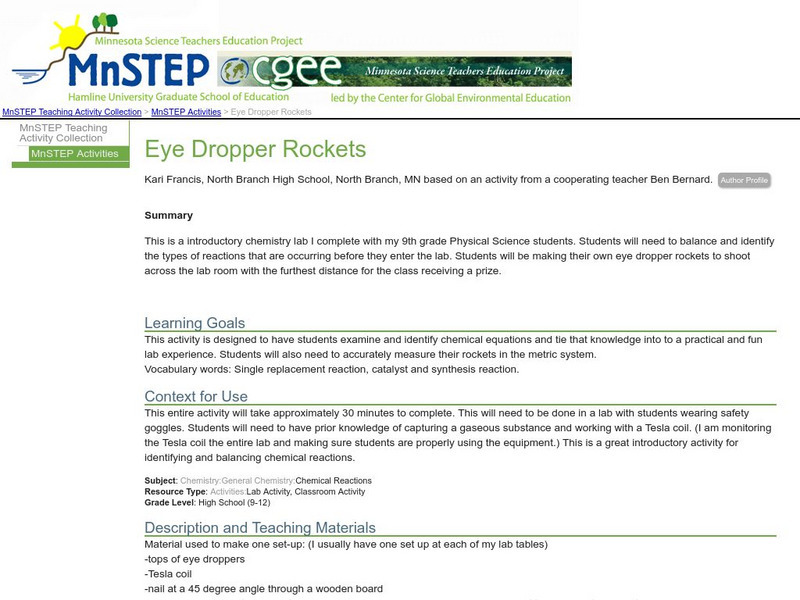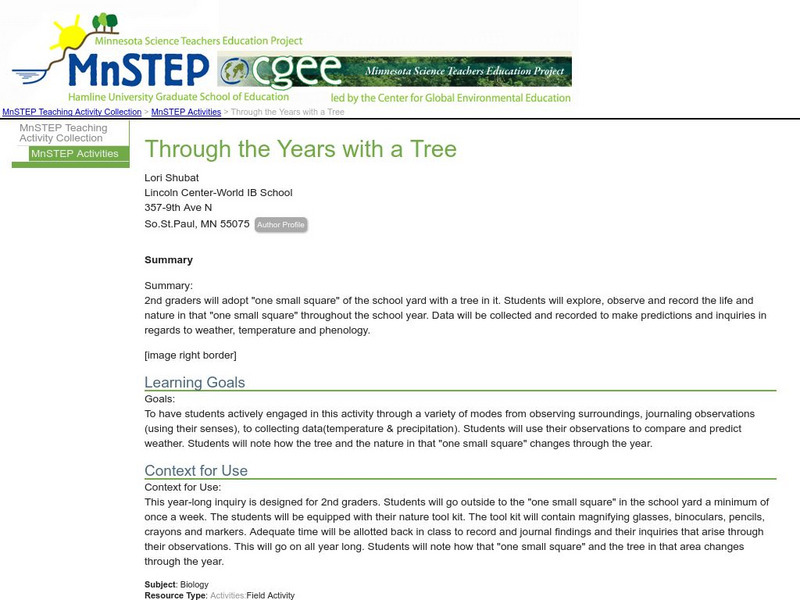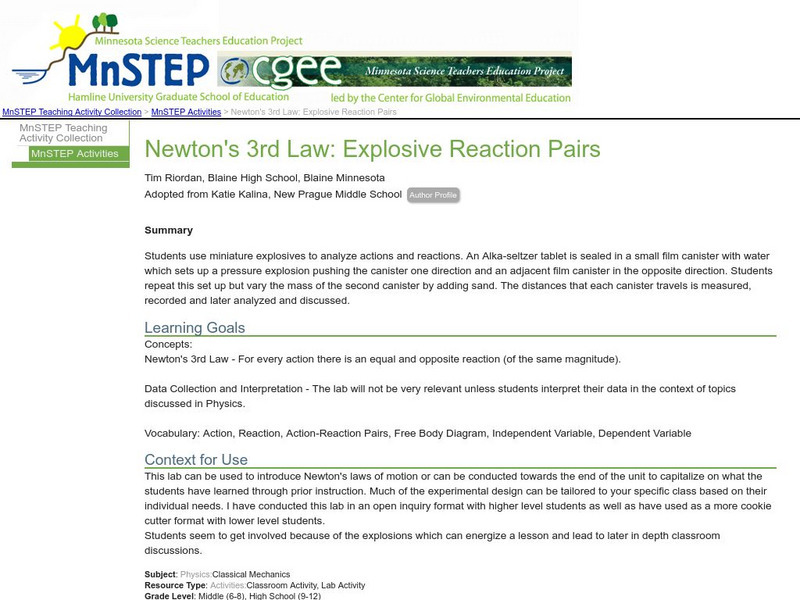Science Education Resource Center at Carleton College
Serc: Mn Step: Student Chemical Reactions Demonstrations
A lab activity where students conduct and analyze assigned chemical reactions, then demonstrate and explain them to the class. Comprehensive lab handouts are included.
Science Education Resource Center at Carleton College
Serc: A Study of the Process of Sediment Deposition and Particle Sorting
Students will investigate the way particles are sorted during deposition using gravel. sand, clay, potting soil, a 2L bottle, and water then form hypotheses as to why sorting occurs in this way.
Science Education Resource Center at Carleton College
Serc: Mn Step: Scientific Method Lab Using Bubble Gum
For this activity, students apply the scientific method while doing an experiment that involves the variables of bubble gum. They will investigate the size of bubbles that can be blown with two different types of bubble gum, and the...
Science Education Resource Center at Carleton College
Serc: Boyle's Law Investigation Using Marshmallows in a Syringe
This activity is designed to accompany lecture on Boyle's law. Students use manipulatives to demonstrate the principles of Boyle's law then summarize their observations on the accompanying worksheet.
Science Education Resource Center at Carleton College
Serc: Exploring Atmospheric Pressure by Making a Barometer
Students create their own barometer, calibrate it with the actual air pressure data, and compare that data with the boiling temperature of their water. They learn from this that atmospheric pressure affects the boiling points of liquid....
Science Education Resource Center at Carleton College
Serc: Trucking and Thinking Newton's First Law of Motion
In this activity students simulate the movement of cargo in the bed of a truck in order to experience Newton's first law of motion.
Science Education Resource Center at Carleton College
Serc: Mn Step: Scientific Measurement: Reviewing Precision vs. Accuracy
This is a review lesson on the concept of precision vs. accuracy in the context of scientific measurement, intended to be used near the beginning of a Physics course. Students practice measuring and reading scales accurately and...
Science Education Resource Center at Carleton College
Serc: Investigating Metal Activity: Determining the Activity Series of Metals
In this chemistry laboratory, students will investigate the activity of 4 unknown metals and rank them according to their activity. In order to achieve this objective, students will be combining a 1M HCl solution with each metal and...
Science Education Resource Center at Carleton College
Serc: Heat Transfer Heat Absorption
Learners will be given a chance to place their hands on two different objects and then predict on which an ice cube will melt more quickly. Students will make a prediction as to what will happen when balloons filled with air and with...
Science Education Resource Center at Carleton College
Serc: Molecules, Molecules, Molecules!
In this activity, learners will prove the theory that matter is made up of tiny particles called molecules. This experiment will show that these "invisible" molecules are always moving and leaving invisible spaces in between.
Science Education Resource Center at Carleton College
Serc: Chemical Changes: Reacting an Acid and Base
In this chemistry lab, students will investigate chemical changes that occur when acids and bases react. It is meant to introduce the concepts of chemical changes, gases have mass, conservation of mass, and balancing equations. Students...
Science Education Resource Center at Carleton College
Serc: Investigating Sound: Using Pipe Music to Understand Pitch and Length.
In this investigation the student will learn about sound waves and vibration. Students will use pipes to understand that the slower an object vibrates the lower the pitch and the faster an object vibrates the higher the pitch. Next...
Science Education Resource Center at Carleton College
Serc: Learning the Science Behind Electricity
Following a PowerPoint lecture, students will participate in a laboratory investigation where they dissect a disposable camera.
Science Education Resource Center at Carleton College
Serc: Conductivity of Water
Students discover that pure water does not conduct electricity and that dissolving different substances in water may or may not cause it to conduct electricity.
Science Education Resource Center at Carleton College
Serc: Investigating Chemical Reactions: Factors Which Influence Rate of Reaction
In this activity, students investigate and discover how surface area, concentration, and temperature affect the rate of a chemical reaction. This lab is designed for students to practice good experimental tests of hypotheses, synthesize...
Science Education Resource Center at Carleton College
Serc: Determining School Population Using Multiple Student Driven Methods
Students create a logical method to estimate the number of students in their building, collect data, and calculate an estimated student population to better understand wildlife population count methods.
Science Education Resource Center at Carleton College
Serc: Investigating Speed and Constant Acceleration
Students roll miniature cars down a ramp and measure their speed and acceleration every 10 cm. Students can vary the type of car, height of ramp or the ramp material. Student change one of these variables to investigate how the car's...
Science Education Resource Center at Carleton College
Serc: Magic Paper
This lesson serves as an introduction to neutralization reactions. Students will observe that the goldenrod copy paper acts as an indicator changing colors and also that an acid can neutralize a base.
Science Education Resource Center at Carleton College
Serc: Eye Dropper Rockets
Students balance and identify the types of chemical reactions, and then using the reaction knowledge, they make eye dropper rockets to shoot across the lab room with the ultimate goal of making it go the farthest.
Science Education Resource Center at Carleton College
Serc: Using Microsoft Excel to Explore Gravity Forces and Accelerations
Students will learn about the force of gravity and the factors that affect it, and use and analyze the universal gravitation equation using Excel spreadsheets.
Science Education Resource Center at Carleton College
Serc: Vector Addition: Determining the Displacement in Your School
In this physics indoor lab students calculate the displacement from one corner of the school to the other.
Science Education Resource Center at Carleton College
Serc: Through the Years With a Tree
Students explore, observe, and record the life and nature in their adopted "one small square" throughout the school year. As they collect data, they make predictions and inquiries in regards to weather, temperature, and phenology.
Science Education Resource Center at Carleton College
Serc: Newton's 3rd Law: Explosive Reaction Pairs
This lab can be used to introduce Newton's 3rd Law of motion - For every action there is an equal and opposite reaction (of the same magnitude). In this exercise, learners use miniature explosives to analyze actions and reactions.
Science Education Resource Center at Carleton College
Serc: Using Velocity and Acceleration Vectors to Interpret the Motion of a Car
Young scholars understand that vectors have both magnitude and direction components as they investigate velocity and acceleration vectors.


